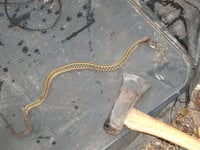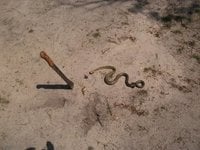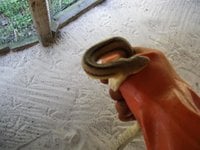Sunshine Flock
Crowing
I'm probably the first ever person to go through a Starbucks drive-thru with a live rattlesnake. I rescued the little fella about a month ago from just off the back deck. It was late and I had to pick my husband up from work, and I was really needing a chai. So that's how that came together.
On the way home, we custom delivered the creature to a nice patch of BLM land at the base of an oak tree. He wasted no time burrowing into the deep layers of dried grasses. They don't always survive relocation, but I think the time of year was good for this and we're hopeful he'll do well.
Today we had another one show up, but this time in front of the chicken coop. Like the last one, this one was a beginner and probably no more than a few months old. The problem is that unlike last time, this one actually bit one of the hens in the face. Hortense found both of them. The first time I saw her jump back quickly and then take some careful steps toward something I couldn't see. Her head was craned and I knew right away it had to be a rattler.
She listened to me and backed away, and her friend got himself a nice, new home about half a mile down the road. Today's friend wasn't so friendly. I heard a chortled jolt of a scream and ran to the chicken coop and only found the snake. No chicken, and I didn't witness the bite.
Today's friend is now headless and buried, not out of revenge but because the husband factor factored in and said I had my one rattler save of the year. The rest get chopped.
As for Hortense, I didn't realize someone had actually been hurt. I decided that maybe Henry the Rooster had been a little too rough with a hen in a baby-making session and that's why I heard such an abrupt sound. But half an hour later I found Hortense on the doormat, all fluffed up and with her neck retracted deep into her feathers. She just didn't look right, so I dug around in her feathers looking for wounds and found nothing. I did some wing tests and feet tests and couldn't find a thing wrong with her.
And then I turned her around and saw the other side of her face. It was swollen, but not horribly, and one of those fleshy wattle extender pieces (not the main wattle but a section back near the ear) was swollen up like a baggy testicle. I couldn't find bite marks because of the texture and the swelling, but there's no doubt, not even a little, about what had happened.
When I came on here to do some research, I found a discussion that basically talked someone out of thinking her chicken had been bitten by a rattler. The chicken survived, and therefore, they concluded, there's no way this was a rattlesnake bite. Google makes everyone an instant expert. I'm here to tell you that not all rattlesnake bites are immediately lethal in chickens. While Hortense may not survive the night, she was walking around a bit, and she accepted a yogurt mixture I made with oregano oil and Manuka honey, and she wiggled quite a bit (not from pain) when I applied some honey to her swollen wattle thing.
These are all signs of a decently alert chicken. It's possible the hangy-down flesh that was bitten somehow kept the venom isolated in its own wattle pouch. It's also possible the young snake's fangs passed through the flesh and didn't have much to sink its fangs into. There are different variables here that didn't result in an immediate death, and one of them is where Hortense was bitten.
In the other discussion the bite was on a leg. Scales are pretty tough, and the twiggy stick parts of a chicken leg aren't fleshy. So it's possible this is why the hen survived. I don't know for sure, but I do know we shouldn't discount a rattlesnake bite. Google is smart but not infallible, and there may be scenarios involving chickens and bites that haven't been researched enough to be able to clearly state, as a fact, that all rattlesnake bites on a chicken result in instant death.
If you have any rattlesnake bite stories to share, I'd love to hear them. Did your chicken survive at least a few hours? If so, what were the symptoms? Did she eventually succumb to the venom and die?
Thanks, folks!!
On the way home, we custom delivered the creature to a nice patch of BLM land at the base of an oak tree. He wasted no time burrowing into the deep layers of dried grasses. They don't always survive relocation, but I think the time of year was good for this and we're hopeful he'll do well.
Today we had another one show up, but this time in front of the chicken coop. Like the last one, this one was a beginner and probably no more than a few months old. The problem is that unlike last time, this one actually bit one of the hens in the face. Hortense found both of them. The first time I saw her jump back quickly and then take some careful steps toward something I couldn't see. Her head was craned and I knew right away it had to be a rattler.
She listened to me and backed away, and her friend got himself a nice, new home about half a mile down the road. Today's friend wasn't so friendly. I heard a chortled jolt of a scream and ran to the chicken coop and only found the snake. No chicken, and I didn't witness the bite.
Today's friend is now headless and buried, not out of revenge but because the husband factor factored in and said I had my one rattler save of the year. The rest get chopped.
As for Hortense, I didn't realize someone had actually been hurt. I decided that maybe Henry the Rooster had been a little too rough with a hen in a baby-making session and that's why I heard such an abrupt sound. But half an hour later I found Hortense on the doormat, all fluffed up and with her neck retracted deep into her feathers. She just didn't look right, so I dug around in her feathers looking for wounds and found nothing. I did some wing tests and feet tests and couldn't find a thing wrong with her.
And then I turned her around and saw the other side of her face. It was swollen, but not horribly, and one of those fleshy wattle extender pieces (not the main wattle but a section back near the ear) was swollen up like a baggy testicle. I couldn't find bite marks because of the texture and the swelling, but there's no doubt, not even a little, about what had happened.
When I came on here to do some research, I found a discussion that basically talked someone out of thinking her chicken had been bitten by a rattler. The chicken survived, and therefore, they concluded, there's no way this was a rattlesnake bite. Google makes everyone an instant expert. I'm here to tell you that not all rattlesnake bites are immediately lethal in chickens. While Hortense may not survive the night, she was walking around a bit, and she accepted a yogurt mixture I made with oregano oil and Manuka honey, and she wiggled quite a bit (not from pain) when I applied some honey to her swollen wattle thing.
These are all signs of a decently alert chicken. It's possible the hangy-down flesh that was bitten somehow kept the venom isolated in its own wattle pouch. It's also possible the young snake's fangs passed through the flesh and didn't have much to sink its fangs into. There are different variables here that didn't result in an immediate death, and one of them is where Hortense was bitten.
In the other discussion the bite was on a leg. Scales are pretty tough, and the twiggy stick parts of a chicken leg aren't fleshy. So it's possible this is why the hen survived. I don't know for sure, but I do know we shouldn't discount a rattlesnake bite. Google is smart but not infallible, and there may be scenarios involving chickens and bites that haven't been researched enough to be able to clearly state, as a fact, that all rattlesnake bites on a chicken result in instant death.
If you have any rattlesnake bite stories to share, I'd love to hear them. Did your chicken survive at least a few hours? If so, what were the symptoms? Did she eventually succumb to the venom and die?
Thanks, folks!!









